When Croatian movie director Dario Jurican ran in the country’s presidential election in 2019, his campaign slogan, ‘corruption for everybody’, promised that normal people would also be able to profit from cronyism. The people reacted with enthusiasm although they knew it was a joke. A similar dynamic is present on the wallstreetbets subreddit, which subverts the financial system by over-identifying with it or, rather, by universalizing it and thereby revealing its in-built absurdity.
The story is well-known already, but let’s briefly recap. Wallstreetbets is a online group in which millions of participants discuss stock and options trading. It is notable for its profane nature and promotion of aggressive trading strategies. Most of its members are young amateurs who ignore fundamental investment practices and risk management techniques, so their activity is considered gambling. Its members recently made (and encouraged others to make) massive investments in the stock of GameStop (a company that had been losing value on the market) which drove the GameStop price up and caused further panic and oscillations on the market.
The decision to invest in GameStop was less motivated by what was going on with the company and more just to raise temporarily the value of its stocks and then play with its oscillations. What this means is that there is a kind of self-reflexivity which characterizes wallstreetbets: what goes on in the companies in whose stocks the participants invest is of secondary importance. The participants primarily count on the effects of their own activity (of massively buying or selling the stocks of a company) on the market.
Critics see in such a stance a clear sign of nihilism, of reducing stock-trade to gambling — as one of the WSB participants put it: ‘I went from a rational investor to some sick irrational desperate gambler.’ This nihilism is best exemplified by the term ‘yolo’ (You Only Live Once) used in the community to characterize people who risk their entire portfolio on a single stock or options trade.
But it’s not simple nihilism that motivates participants: their nihilism signals indifference towards the final result — or, as Jeremy Blackburn, an assistant professor of computer science at Binghamton University, put it: ‘It’s not even the ends that matter. It’s the means. It’s the fact that you’re placing this bet, that’s where the value in all this is. Sure, you may get money, or you may end up broke, but you played the game, and you did it in some crazy way.’
In his psychoanalytic theory, Jacques Lacan distinguishes between direct pleasure (enjoying the object we want) and surplus-enjoyment. For example, many people enjoy the activity of shopping more than what they actually buy. Wallstreetbets members have brought this surplus-enjoyment of stock-exchange gambling out into the open.
The popular appeal of wallstreetbets means that millions of ordinary people participate in it. A new front in America’s class war has opened up — as Robert Reich tweeted: ‘So let me get this straight: Redditors rallying GameStop is market manipulation, but hedge fund billionaires shorting a stock is just an investment strategy?’ Who would have expected this — a class war transposed into a conflict among stock investors and dealers themselves?
So it’s ‘kill the normies’ again, to repeat the title of Angela Nagle’s book. In this case, the ‘normies’ are the so-called rational investors and hedge fund managers. But this time the normies should actually be ‘killed’ (eliminated). We are in a situation in which Wall Street, the model of corrupt speculation and inside-trading, always by definition resisting state intervention and regulation, now opposes unfair competition and calls for state intervention. In short, wallstreetbets is doing openly what Wall Street has been doing in secret for decades.
The utopia of populist capitalism — the ideal of millions who are during the day ordinary workers or students and in the evening play with investments — is, of course, impossible to realize, it can only end in self-destructive chaos. But is it not in the very nature of capitalism to be periodically in crises — the Big One of 1928 and the financial meltdown of 2008, to mention just the two best-known cases — and to come out of them even stronger?
However, in all the old cases it was (and is) impossible to restore balance through market mechanisms, because the price is too high, so a massive external (state) intervention is needed. Can the state then control the game again and restore a normality ruined by wallstreetbets?
What then is the solution? The excesses of wallstreetbets brought into the open the latent irrationality of the stock exchange itself. It isn’t a rebellion against Wall Street but something potentially much more dangerous: it subverts the system by over-identifying with it, just like the presidential candidate in Croatia with his placard.
Yes, what the wallstreetbets members are doing is nihilistic, but it is nihilism immanent to the stock exchange itself, a nihilism already at work in Wall Street. To overcome this nihilism, we will have to move out of the game of the stock exchange. The moment of socialism is lurking in the background, waiting to be seized, since the very center of global capitalism is beginning to fall apart.
Will this happen? Almost certainly not, but what should worry us is that this latest crisis is another unexpected threat to the system already under attack from multiple sides (by the pandemic, global warming, social protests…). Moreover, this threat comes from the very heart of the system not from outside. An explosive mixture is in the making, and the longer the explosion is postponed, the more devastating it could be.

























